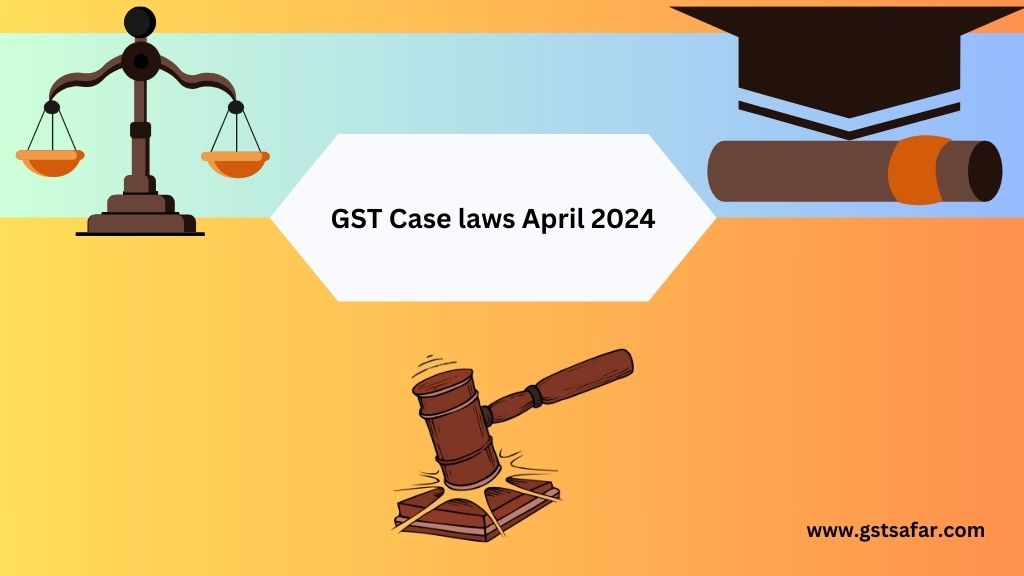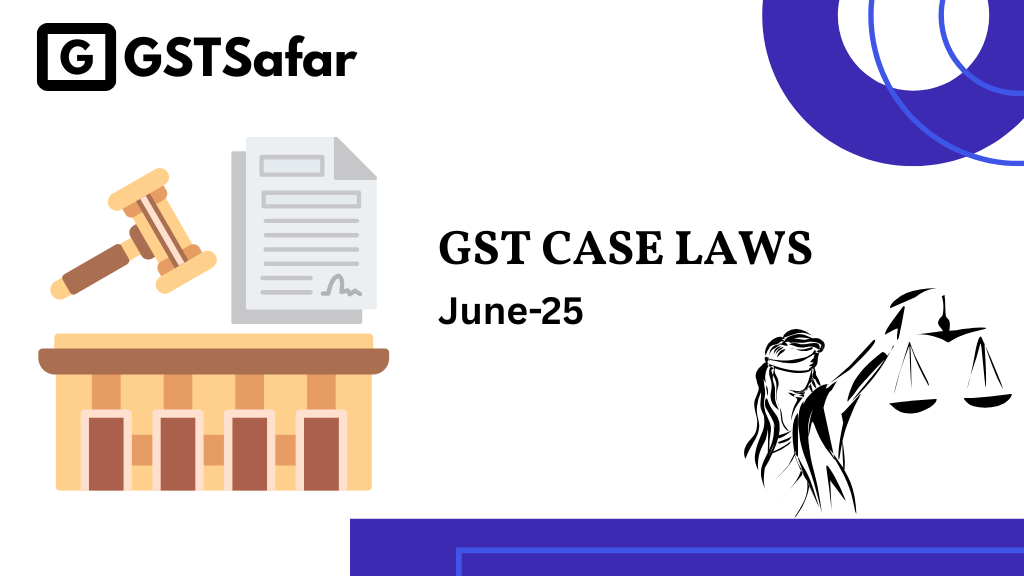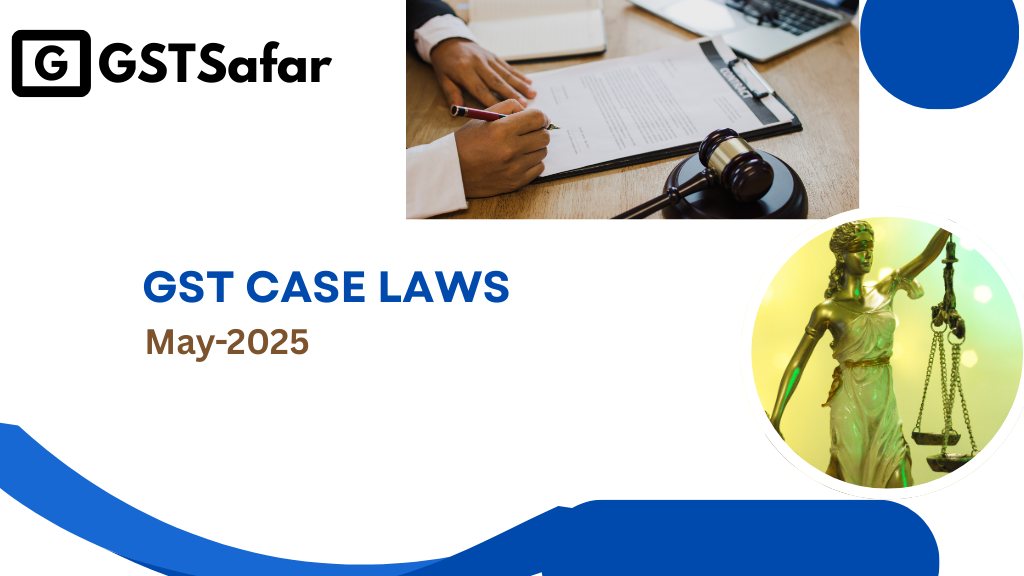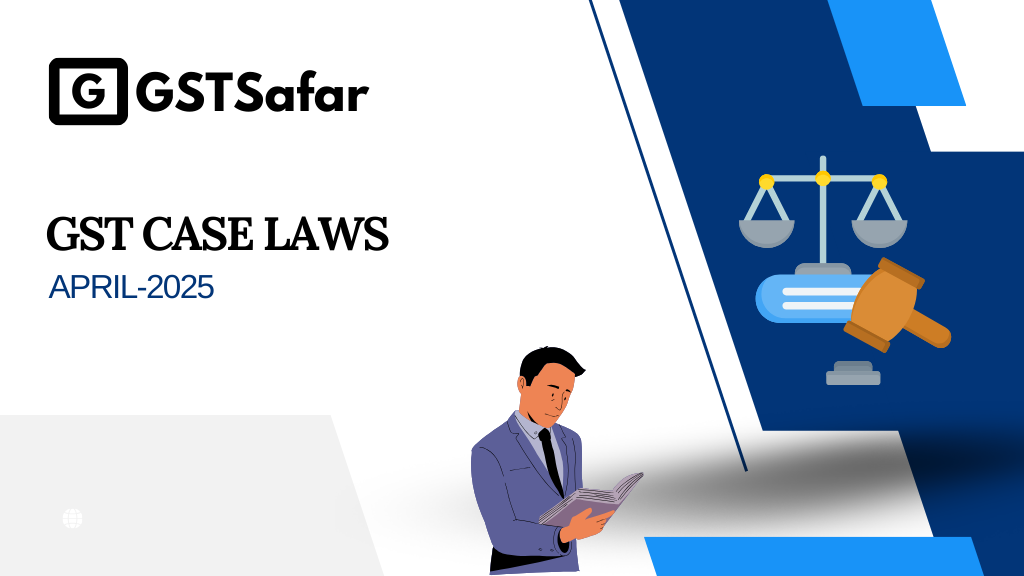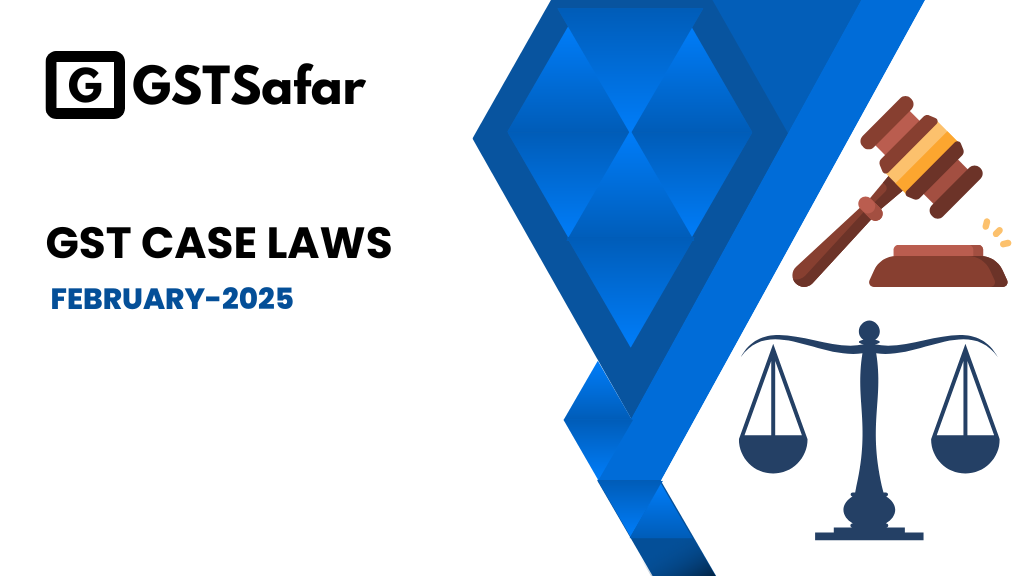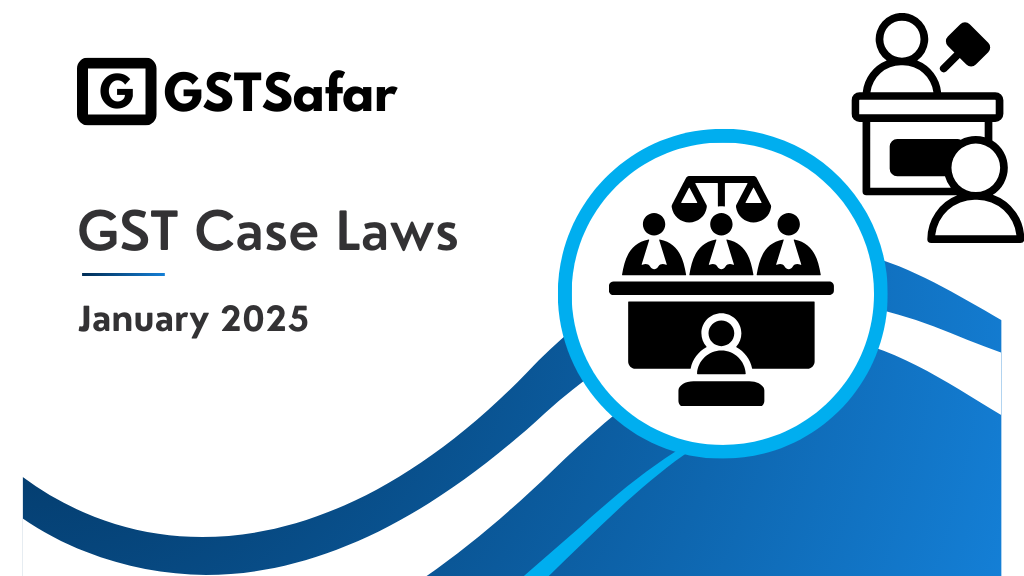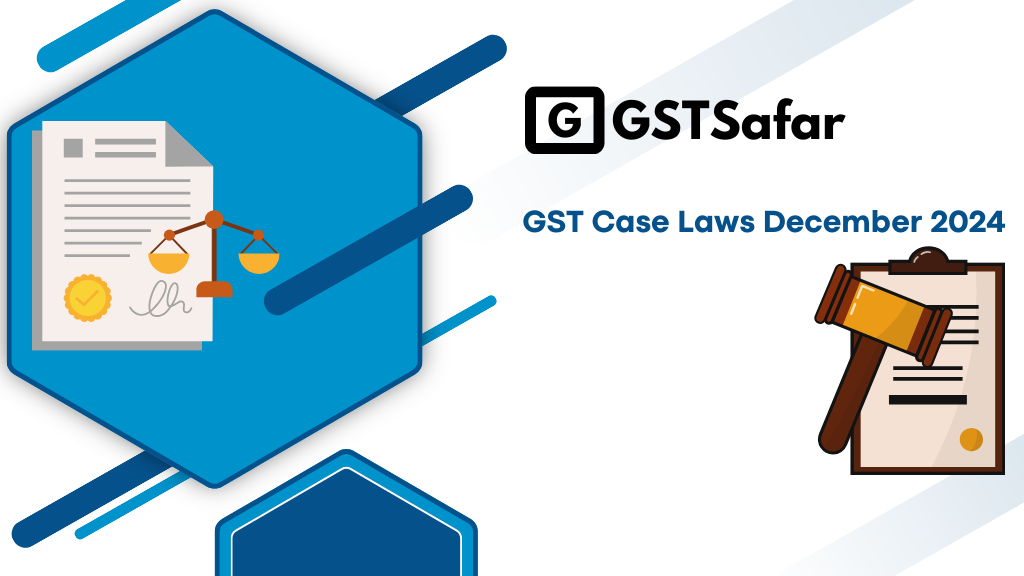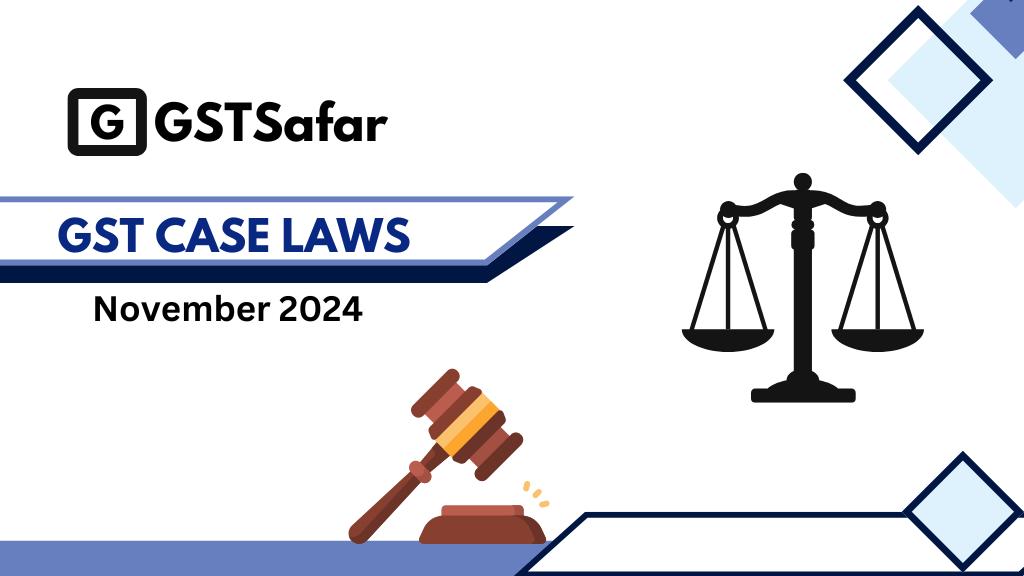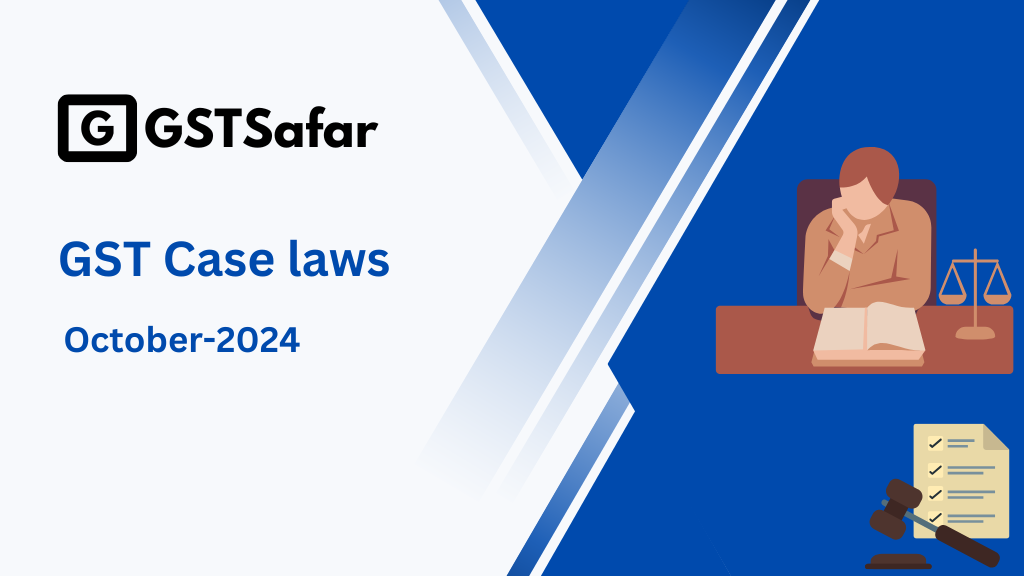The goal of this article is to cover all recent GST case laws 2024. All latest high court judgement on gst and all latest supreme court judgments on gst issued in April 2024 have been covered in this article. All latest GST case laws of April 2024 in this article have been classified by name, date, judge, counsel, GST concept, GST section, etc. In addition, a PDF of the GST case law is provided with the case law so that the user can download it for further study.
Table of Contents
ToggleGST Case law on Reconsideration of Input Tax Credit (ITC) Issue | Recent GST Case laws 2024
Madras High Court says company to pay 10% of the disputed tax within two weeks.
| High Court : Madras High Court Judgement 2024 |
| Name of case : Rishab Industries Vs The Assistant Commissioner (ST), |
| Date of Judgment : 23-04-2024 |
| Appeal No : W.P.No.10627 of 2024 and W.M.P.Nos.11701, 11702 & 11708 of 2024 |
| Judges : SENTHILKUMAR RAMAMOORTHY |
| Counsel Name : Mr.S.Ramanan |
| Fact of the Case: Rishab Industries, a company dealing with plastic scraps, had some issues regarding Input Tax Credit (ITC) under GST. The difference between their tax returns (GSTR 3B) and auto-generated data (GSTR 2A) was small, just Rs. 19,341. They claimed their consultant didn’t keep them updated about legal proceedings leading to a tax demand. |
| Held by court : The Madras High Court looked into the case and found the tax demand unjust considering the minor difference. They decided to give Rishab Industries a chance to contest the demand properly. The court canceled the previous order, asking the company to pay 10% of the disputed tax within two weeks and respond to the legal notice during the same period. |
| In favor of : Assessee |
| Topic of GST : GSTR-3B VS GSTR-2A Discrepancies |
GST Case law on Expired E-way Bill | Recent GST Case laws 2024
The Rajasthan High Court observed that the e-way bill had expired, and there was no intent on the part of the applicant to evade taxes.
| High Court : Rajasthan High Court Judgement 2024 |
| Name of case : Faruk Rathore Prop. VS Dy. Commissioner, Central Goods And Service Tax, |
| Date of Judgment : 15-04-2024 |
| Appeal No : D.B. Civil Writ Petition No. 13473/2022 |
| Judges : HON’BLE DR. JUSTICE PUSHPENDRA SINGH BHATI, HON’BLE MR. JUSTICE MUNNURI LAXMAN |
| Counsel Name : Mr. Shafi Mohammad Chouhan , Mr. V.R. Choudhary |
| Fact of the Case: Faruk Rathore from Hindustan Trading Company had a problem with a big fine he got for a small mistake related to an expired GST e-way bill during a delivery. He deals with iron items and bought goods worth almost 10 lakh rupees. To transport them, he got an e-way bill that lasted until a certain date, but due to unexpected issues like a flat tire and not enough workers, the goods reached late and the e-way bill expired a little before they arrived. Because of this, his goods were stopped, and a big penalty was imposed under the CGST Act of 2017. Even though he followed all the GST rules and paid his taxes properly, he still got hit with a hefty fine. Faruk argued that the delay wasn’t his fault and didn’t involve cheating on taxes. He mentioned similar cases from other courts where the penalty was lifted for similar situations. |
| Held by court : After looking into Faruk Rathore’s case, the Rajasthan High Court agreed with him. They said that the big fine he got wasn’t fair for such a small mistake. They saw that his e-way bill had expired, but he didn’t mean to avoid paying taxes. So, the court decided to lower the penalty to Rs 10,000, following a rule in the CGST Act of 2017. |
| In favor of : Assessee |
| Topic of GST : E-way Bill |
| Section of GST: Rule 138 of CGST Rules,2017 & section 122 of CGST Act,2017 |
GST Case law on Interest for Delayed Tax Returns Regardless of Payment Source |Recent GST Case law 2024
Patna High Court says the late filing triggers the interest, regardless of how you paid.
| High Court : Patna High Court Judgement 2024 |
| Name of case : Sincon Infrastructure (P.) Ltd. vs. Union of India |
| Date of Judgment : 19-04-2024 |
| Appeal No : CIVIL WRIT JURISDICTION CASE NOS. 11621 AND 3592 OF 2023 APRIL 19, 2024 |
| Judges : K. VINOD CHANDRAN, CJ. AND HARISH KUMAR, J. |
| Counsel Name : Gautam Kumar Kejriwal, Atal Bihari Pandey, Alok Kumar Jha, Mukund Kumar, Akash Kumar, Aditya Raman and Ranjeet Kumar |
| Fact of the Case: The petitioner, who is the taxpayer, didn’t pay the interest on late tax payments for the years 2017 to 2019 as required by submitting DRC-3 forms. Specifically, they didn’t pay interest for late cash payments in the 2017-18 financial year and for late payments in the 2018-19 financial year. As a result, the tax authorities issued a strong order demanding the payment of this interest. |
| Held by court : According to section 50(1), interest charges automatically apply when tax returns are filed late, regardless of whether the payment is made using the Electronic Credit Ledger or Electronic Cash Ledger. So, the argument that interest was only due when the return was late and the payment came from the Electronic Cash Ledger was rejected. Interest charges aren’t linked to the availability of credit in the Electronic Credit Ledger because tax payment only happens when returns are filed. Therefore, the writ petition should be dismissed, and there’s no need to send it back for further assessment because interest charges apply even if there was credit available in the Electronic Credit Ledger |
| In favor of : Revenue |
| Topic of GST : |
| Section of GST: Section 50 of CGST Act,2017 |
GST Case law on Violation of Principal of Natural Justice in Recovery Proceedings | Recent GST Case law 2024
Bombay High Court says the order that led to attaching the taxpayer’s bank account happened without giving the taxpayer a chance to explain their side or be heard.
| High Court : Bombay High Court Judgement 2024 |
| Name of case : Prasanna Karunakar Shetty vs. State of Maharashtra |
| Date of Judgment :16-04-2024 |
| Appeal No : WRIT PETITION NO. 3098 OF 2024 |
| Judges : G.S. KULKARNI AND FIRDOSH P. POONIWALLA, JJ. |
| Counsel Name : Arun Jain and Kartik Vig |
| Fact of the Case: The case revolves around the taxpayer (the petitioner-assessee) whose Director Identification Number (DIN) was disqualified in November 2017, and who formally resigned from the company in May 2019. The taxpayer’s argument is that they ceased to be a director of the company on May 25, 2019. However, a show cause notice was issued on August 7, 2020, demanding GST payment along with penalties. Subsequently, an order confirming the demand was issued. In November 2022, the taxpayer received a summons regarding an FIR lodged against them. The session court granted anticipatory bail in this matter. In 2023, recovery proceedings were initiated against the taxpayer, resulting in an order attaching their bank account. The main argument put forth by the taxpayer is that no show cause notice was issued to them, and since they had already ceased to be a director of the company, the attachment order should not have been passed. |
| Held by court : The order against the taxpayer should have been based on verified facts and should have included a show cause notice, allowing the taxpayer to respond with solid evidence. However, the taxpayer wasn’t given a show cause notice or a chance to present their side before the order was passed. As a result, the taxpayer’s petition was successful. |
| In favor of : Assessee |
| Topic of GST : Recovery of Tax & Principal of Natural Justice |
| Section of GST: Section 79 of CGST Act,2017 |
GST Case law on Assessment Order and Opportunity to be Heard | Recent GST Case law 2024
Madras High court says taxpayer should have chance to speak before order made & the taxpayer needs to pay an extra Rs. 3,00,000 as previously agreed upon.
| High Court : Madras High Court Judgement 2024 |
| Name of case : K.C. Mathaiyan vs. Assistant Commissioner (ST) |
| Date of Judgment : 03-04-2024 |
| Appeal No : W.P. NO. 8849 OF 2024 W.M.P. NOS. 9845 AND 9846 OF 2024 |
| Judges : SENTHILKUMAR RAMAMOORTHY, J. |
| Counsel Name : T. Ramesh |
| Fact of the Case: The petitioner, who is a works contractor handling civil projects for government bodies, received a show cause notice regarding a mismatch between their GSTR 1 statement and GSTR 3B returns. Before the assessment order was issued, the petitioner paid Rs. 3,00,000, which was 10% of the total tax amount. The petitioner argued that the delay in reconciling the discrepancy was due to late payments from government departments. They also claimed that the penalty imposed was unfair. |
| Held by court : The petitioner wasn’t given a chance to speak before the order was issued. To ensure fairness, it’s important to let the petitioner have that opportunity. Therefore, the order should be canceled, but the petitioner must pay an extra Rs. 3,00,000, which adds up to about 20% of the tax amount owed, as previously agreed upon. |
| In favor of : Assessee |
| Topic of GST : Demand and Recovery |
| Section of GST: Section 74 of CGST Act,2017 |
GST Case law on Insufficient Review of Taxpayer’s Detailed Response | Recent GST Case law 2024
Delhi High Court says despite the detailed reply from the taxpayer, the assessment order under Section 73 of the CGST Act claimed that the response was incomplete,
| High Court : Delhi High Court Judgement 2024 |
| Name of case : Bona Vita Technologies (P.) Ltd. vs. Sales Tax Officer |
| Date of Judgment : 02-04-2024 |
| Appeal No : W.P. (C) NO. 4718 OF 2024 CM APPL. NO. 19296 OF 2024 |
| Judges : SANJEEV SACHDEVA AND RAVINDER DUDEJA, JJ. |
| Counsel Name : Ashwini Chandrasekaran, Ms. Priyanka Rathi, Ms. S. Gupta, and Abhishek Jain, |
| Fact of the Case: The tax authority did not properly consider the response given by the taxpayer. Despite the taxpayer providing a detailed reply to the show cause notice, including full disclosure under each category, the tax authority’s order under Section 73 of the CGST Act stated that the reply was incomplete, lacked sufficient supporting documents, was unclear, and unsatisfactory. |
| Held by court : The observations made in the challenged order weren’t justified because the taxpayer had provided a detailed response. The tax officer didn’t carefully review the reply submitted by the taxpayer. If the officer thought more information was needed, they should have asked the taxpayer directly, which they didn’t do. Therefore, the challenged order should be canceled or set aside. |
| In favor of : Assessee |
| Topic of GST : Determination of Tax |
| Section of GST: Section 73 of CGST Act,2017 |
GST Case law on Cancellation of GST Registration Despite Pending DRC-01 Proceedings | Recent GST Case law 2024
Delhi High Court says the GST registration should be considered cancelled from the date the taxpayer initially requested the cancellation because the DRC-01 proceedings can carry on separately from the cancellation process.
| High Court : Delhi High Court Judgement 2024 |
| Name of case : Chetan Garg vs. Avato Ward 105 State Goods and Service Tax |
| Date of Judgment : 05-04-2024 |
| Appeal No : W.P. (C) NO. 4509 OF 2024 CM APPL. NO. 18423 OF 2024 |
| Judges : SANJEEV SACHDEVA AND RAVINDER DUDEJA, JJ |
| Counsel Name : Anurag Rajput, Sahil Puri, Sahib Rajput and Dhruv Bhardwaj, |
| Fact of the Case: The taxpayer applied to cancel their GST registration because they didn’t plan to continue their business under that GST number. The application was rejected because there were pending show cause notices against the taxpayer. The taxpayer responded to a query about their application, but it was still rejected. Later, the taxpayer applied again for cancellation and also filed a new application asking the authorities to cancel their GST registration. The tax department argued that they had issued show cause notices to the taxpayer for multiple financial years.the taxpayer wanted to cancel their GST registration, but their application was rejected due to ongoing show cause notices from the tax department. |
| Held by court : The proceedings under DRC-01, which is a form used for voluntary payment or payment after issuance of demand notice under GST, were separate from the process of cancelling a GST registration. Even if the GST registration was cancelled, the tax authorities could still pursue recovery of any outstanding amounts. Simply having a pending DRC-01 form didn’t automatically mean that the request to cancel the GST registration should be denied. The tax authorities could proceed with recovery regardless of the registration status. In short, just because there was a pending DRC-01 form, it didn’t prevent the tax authorities from cancelling the GST registration if that’s what the taxpayer requested, and they could still recover any owed amounts even after cancellation. |
| In favor of : Assessee |
| Topic of GST : Cancellation of Registration |
| Section of GST: Section 29 of CGST Act,2017 |
GST Case law on Clarifying Pre-Deposit Requirements in Appellate Tribunals| Recent GST Case law 2024
Calcutta High court says if the law clearly says that only a percentage of the disputed tax should be paid upfront, and not the interest, then the part of the court order asking the assessee to pay 20% of the remaining interest should be cancelled or set aside.
| High Court : Calcutta High Court Judgement 2024 |
| Name of case : Evergreen Construction, Durgapur (P.) Ltd.vs. Commissioner of Commercial Taxes, Government of West Bengal |
| Date of Judgment : 09-04-2024 |
| Appeal No : MAT NO. 425 OF 2024 IA NO. CAN 1 OF 2024 |
| Judges : T. S. SIVAGNANAM, CJ. AND HIRANMAY BHATTACHARYYA, J. |
| Counsel Name : Ritika Kurmy, D. Dutta and Dev Agarwal |
| Fact of the Case: an appellate tribunal refers to a court that hears appeals against decisions made by lower courts or authorities. Pre-deposit refers to an initial payment that needs to be made before an appeal can be heard. In this case, the appeal challenges an interim order from the court that directed the appellants (the people appealing) to deposit 20% of the disputed unpaid interest. The dispute itself originated from an adjudication order, which demanded interest because tax returns were filed late. The person appealing, called the assessee, argues that Section 112, which deals with filing appeals before the appellate tribunal, doesn’t mention the requirement of making a pre-deposit of 20% of the disputed interest. In simpler terms, the appellant is questioning whether they should have to pay 20% of the disputed interest upfront as directed by the court, based on the rules laid out in Section 112 for appealing to the appellate tribunal. |
| Held by court : Section 112(8)(b) specifies that the pre-deposit amount should be 20% of the remaining tax in dispute, not including interest. When the legislative intent is clear from the wording of the law, the court should follow that intent. In simpler terms, because the law clearly says that only tax should be considered for the pre-deposit and not interest, the court should have set aside the part of the order that directed the assessee to pay 20% of the remaining interest. |
| In favor of : Assessee |
| Topic of GST : Appeal to appellate authority |
| Section of GST: Section 112 of CGST Act,2017 |
GST Case Law on Tax Classification of Parota | Recent GST Case Law 2024
The Kerala High Court has determined that both Classic Malabar Parota and Whole Wheat Malabar Parota fall under heading number 1905 and are subject to a tax rate of 5%.
| High Court : Kerala High Court Judgement 2024 |
| Name of case : Modern Food Enterprises (P.) Ltd.vs.Union of India |
| Date of Judgment : 02-04-2024 |
| Appeal No : WP (C) NO. 13935 OF 2021 |
| Judges : DINESH KUMAR SINGH, J. |
| Counsel Name : M. Gopikrishnan Nambiar, K. John Mathai, Joson Manavalan, Kuryan Thomas, Paulose C. Abraham, Raja Kannan, R. Chethan Krishna, and S. Parvathi, |
| Fact of the Case: The petitioner, who is the taxpayer in this case, is a company that makes and sells food products. They are specifically dealing with two types of products: Classic Malabar Parota and Whole Wheat Malabar Parota. |
| Held by court : The Explanatory Notes to the HSN subheading 1905 describe that products under this heading typically include cereal flours, leavens, salt, and may also have other ingredients like gluten, starch, milk, sugar, fats, and improvers such as yeast or baking soda. These additional ingredients help in fermentation and improve the characteristics and appearance of the products. Since the products manufactured and supplied by the assessee (the taxpayer) are similar to those mentioned in the HSN code 1905 of Chapter 19, they should be taxed at a rate of 5% as per Serial Number 99A of Notification 1/2017-Central Tax (Rate). This is because the ingredients used and the process applied in preparing these products are comparable to those mentioned in Chapter heading HSN Code 1905. |
| In favor of : Assessee |
| Topic of GST : Levy of Tax |
| Section of GST: Section 9 of CGST Act,2017 |
GST Case law on Entitlement to IGST Refund for Exported Goods | Recent GST Case law 2024
Bombay High Court says the assessee should not be denied the refund.
| High Court : Bombay High Court Judgement 2024 |
| Name of case : Venus Jewel vs.Union of India |
| Date of Judgment : 08-04-2024 |
| Appeal No : WRIT PETITION NO. 5072 OF 2022 |
| Judges : G.S. KULKARNI AND FIRDOSH P. POONIWALLA, JJ. |
| Counsel Name : Ms. Parisha Shah, Rajesh Shah and Arsil Shah |
| Fact of the Case: The firm, a Four Star Export House, exported goods from July 2017 to December 2018. They followed the ‘Consignment Basis’ for exports, paying IGST on confirmed goods and providing all necessary documents to the authorities. The question is whether they’re entitled to a refund of the IGST paid on these goods, along with interest, when presenting shipping bills for confirmed sales during that period. |
| Held by court : The exporter, the assessee, submitted shipping bills as part of their export process, which automatically served as an application for a refund of the IGST paid on the exported goods. There was no time limitation issue. The assessee had the right to seek this refund under Rule 96 and 96A of the CGST Rules and had followed all the necessary provisions of both the Customs Act and the GST Act. Despite data compatibility issues between the Customs Department and the GST Department, as well as issues with electronic portals under the GST regime, the assessee should not be denied the refund. The conflicting positions taken by different authorities regarding the refund were unfair to the assessee and prejudicial. Therefore, the refund, along with interest, should be granted to the assessee. |
| In favor of : Assessee |
| Topic of GST : Refund of IGST |
| Section of GST: Section54 of CGST Act,2017 , Rules 96 & 96A of CGST Rules,2017 |
GST Case law on Invalid Calculation of Stock by Appellate Authority | Recent GST Case law 2024
Allahabad High Court says the appellate authority’s calculation of stock based on an estimate, without actually weighing or counting it, has no legal basis.
| High Court : Allahabad High Court Judgement 2024 |
| Name of case : Eco Plus Steels (P.) Ltd. vs. State of U.P. |
| Date of Judgment : 12-04-2024 |
| Appeal No : WRIT TAX NOS. 916 & 1600 OF 2022 |
| Judges : SHEKHAR B. SARAF, J. |
| Counsel Name : Shekhar B. Saraf |
| Fact of the Case: The petitioner, who is an assessee, challenged the orders made by the Assessing Officer and the Appellate Authority regarding the confiscation of goods and penalties related to extra stock. The confiscation was based on estimation rather than actually weighing or counting the stock. The petitioner argued that this counting could have easily been done at their location. |
| Held by court : The Appellate Authority calculated the stock based on an estimate without any legal basis. According to legal precedents, confiscating goods solely on visual estimation isn’t allowed. The whole process showed a careless and ineffective approach by the authorities who conducted the survey poorly, issued notices late, and then imposed penalties and confiscations. The responsibility to prove penalties and confiscations lies with the revenue department, and guessing isn’t a substitute for actual verification. Thus, the challenged orders should be canceled and nullified. |
| In favor of : Assessee |
| Topic of GST : Confiscation of Goods |
| Section of GST: Section 130 & 74 of CGST Act,2017 |
GST Case law on Inclusion of Small-Scale Ice Cream Manufacturers in Composition Levy | Recent GST Case law 2024
Chhattisgarh High Court says that ice cream is enjoyed by many people in India, it shouldn’t be treated as a luxury item.
| High Court : Chhattisgarh High Court Judgement 2024 |
| Name of case : Small Scale Ice Cream Manufacturer Association vs. Union of India |
| Date of Judgment : 01-04-2024 |
| Appeal No : W.P. (C) NO. 2139 OF 2019 |
| Judges : RAKESH MOHAN PANDEY, J. |
| Counsel Name : A.V. Shridhar |
| Fact of the Case: The petitioner, an association representing Small Scale Ice Cream Manufacturers, has legally challenged the decision of the GST Council to exclude Ice Cream Manufacturers from the Composition Levy under section 10 of the GST Act. The petitioner contends that this decision is arbitrary and unjust, as it places ice cream in the same category as products such as Pan Masala and Tobacco, consequently subjecting them to a tax rate of 18%. The argument posits that ice cream does not warrant such classification as a luxury item and should not be taxed at a higher rate akin to those products. |
| Held by court : The majority of ice cream businesses are small-scale and have low turnover and transactions compared to big brands. When deciding on tax rates based on language, tax laws must also pass the fairness test outlined in Article 14 of the Indian Constitution. This means classifications in taxation shouldn’t be random or avoidant; they should have clear and reasonable distinctions that make sense. Ice cream, being widely consumed by people from all walks of life, shouldn’t be considered a luxury item. The GST Council should have considered these socio-economic factors when making decisions. The petition asks the council to reconsider excluding small-scale ice cream manufacturers from the benefits of Section 10(1) based on legal precedents. |
| In favor of : Assessee |
| Topic of GST : Composition levy |
| Section of GST: Section 10 of CGST Act,2017 |
Read similar article
